Muhammad Ali
A fighter from birth, his transformation from a chiled in pain to a happy soul is remarkable
In a small, humble village, a distressed mother cradled her infant son, Muhammad Ali. She was heartbroken, suffering under the weight of having lost Muhammad Ali’s twin at birth, and from being unable to soothe her surviving child.
At six months old, Muhammad Ali had severe extensor thrust which means his spine was arched backward in the shape of a C, his tiny hands tight behind his back. He cried incessantly, as his heartbroken mother was barely able to feed him, hold him, or soothe his cries.
Desperate for help, she brought Muhammad Ali to Akbar Kare Institute (AKI). The team at AKI immediately understood the severity of his condition and the immense stress on his mother. They provided her with guidance, coached on different therapeutic positioning, handling and strategies to decrease the extensor thrust and making it easier to feed and comfort him.
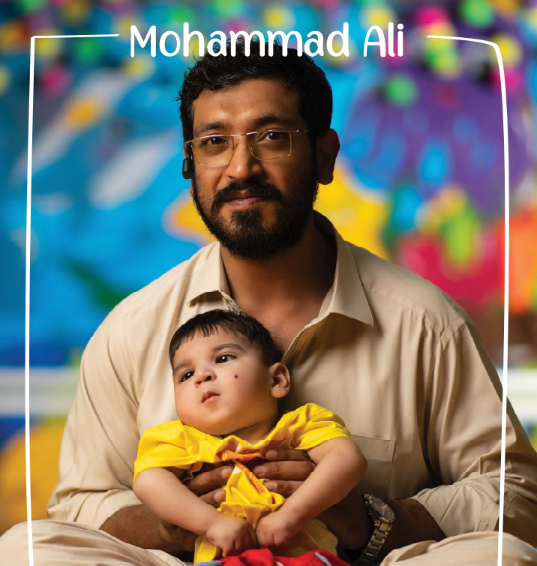
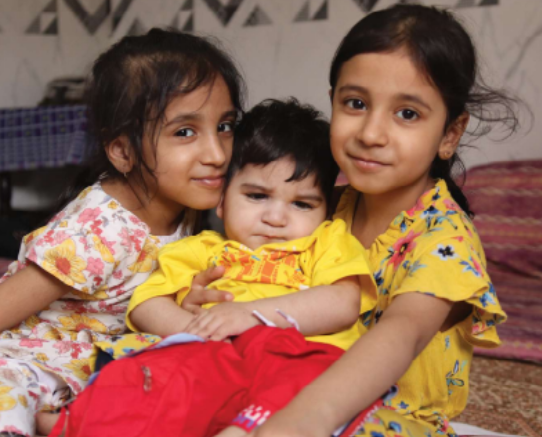
The transformation began swiftly. Within just two months, Muhammad Ali’s life started to change. Through different positioning, handling and activities his extensor thrust decreased, he began to smile, his cries diminished, and he could finally sit in his mother’s lap without pain. The relief and joy on his mother’s face was immeasurable. For the first time, she saw her son not as a symbol of their hardship but as a beacon of hope.
Now 16 months old, Muhammad Ali’s progress continues to inspire everyone at AKI. He does not cry all the time, he can sit in the chair in an upright posture in a better position to interact with caregivers and his surroundings. His mother’s distress has turned into hope and gratitude, witnessing her son’s remarkable improvement. The bond between mother and son has strengthened, no longer marred by pain and helplessness.
Ali
Ali’s case is testament to tranformative power of consistent therapy and umwavering social support

Four-year-old Ali faced an overwhelming challenge. Ali could not stand without support, and doctors had delivered a heartbreaking prognosis: Ali might never walk. His father, struggling with the burden, was not supportive, leaving Ali’s mother to carry the weight of their worries alone. Determined to find hope for her son, Ali’s mother sought help from Akbar Kare Institute.
Ali’s journey at AKI began with uncertainty, but the dedicated team at the institute welcomed him with open arms. His mother and grandmother faithfully took him to his monthly therapy sessions, where he received specialized care and encouragement. The therapists at AKI worked tirelessly, believing in Ali’s potential to defy the odds.
Over the next two years, Ali’s progress was tremendous. At six years old, Ali can now walk and even run, a testament to the transformative power of consistent therapy and unwavering support. The once-fisted hand that many thought would never function is now able to catch a ball, allowing Ali to play and explore the world around him. His mother often tells him to sit and rest, but Ali revels in his newfound ability to be on his feet.
The transformation in Ali’s life is a shining example of the incredible impact that AKI has on the lives of children and their families. The institute provided not just therapy but hope and a future for Ali.
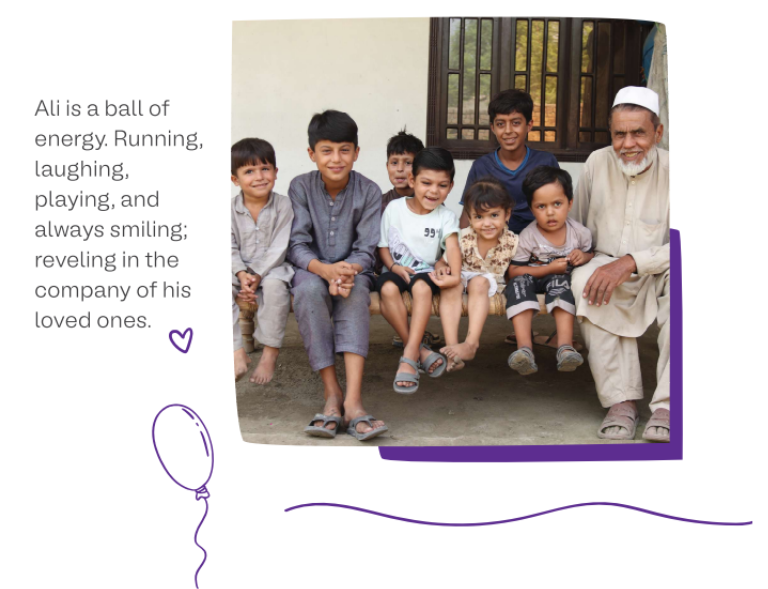
Sudais
Sudais looks up from his textbook as he hears his father’s rickshaw sputter to stop outside his window. He leaves the book and wheels himself outside to welcome his father with a beaming smile. Born with a rare condition called Amelia — Sudais was born with no arms and a missing left leg. His poverty–riddled family, based in Charsadda, had given him up as a lost cause – believing that there was nothing anyone could do. It was only when they visited AKI, that too, for his disabled sister, that the team at AKI found out about Sudais.
Little did the family know that the visit would change not only their daughter’s life but would also be a turning point for their son.
Sudais amazed the AKI team with his resourcefulness. He was adept at playing games on electronic gadgets using his toes, showcasing a remarkable dexterity that hinted at his untapped potential. To nurture this, AKI provided him and his sister with board markers and notebooks to practice writing and drawing. They enrolled him in a local school, ensuring he had the opportunity to receive a formal education.
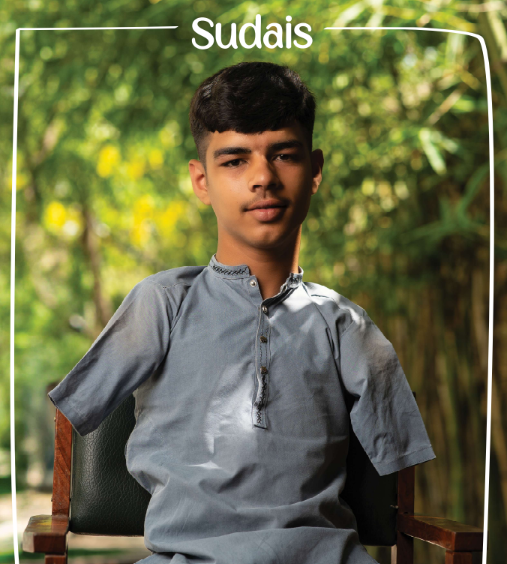
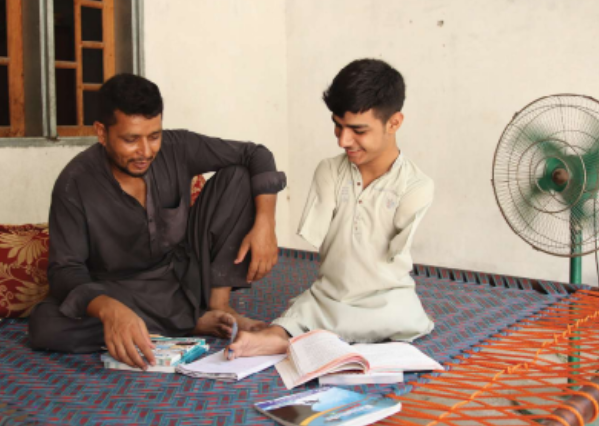
Understanding the unique challenges Sudais faced, AKI went further, modifying an electric wheelchair that he could operate using his right foot. The team installed a ramp at his home, and modified the washroom to ensure that he did not have to rely on anyone. AKI donated a rickshaw to Sudais’s father to help him earn a steady income and support the family.
AKI transformed Sudais’s life in ways his family had never imagined. From a boy whose future was dark and uncertain, he blossomed into a confident, capable young man. Now in grade 9, Sudais consistently ranks among the top scorers in his class.
AKI was able to polish this diamond in the rough and give him the support he needed to flourish and live a dignified life. His academic achievements are a testament to his hard work and to AKI’s compassionate and holistic model of care.
Roohullah
At 11 years old, suffering from quadriplegia cerebral pulsy, Roohullah has overcome the odds to train for special olympics.
In the tumultuous and conflict-ridden region of Waziristan, a baby named Roohullah was born into a life marked by immense hardship. His father, a brave and dedicated police officer, was tragically killed in the line of duty, leaving behind a grieving family struggling to cope with both emotional and financial loss. To add to their burden, Roohullah was born with quadriplegia Cerebral Palsy, a condition that affected all four of his limbs and left him entirely dependent on caregivers for even the most basic tasks.
Determined to give him a chance at a better life, his family brought him to Akbar Kare Institute (AKI). At the time of his arrival, Roohullah could neither sit up nor feed himself. But with patience, dedication, and the expert care provided by the AKI team, his condition began to improve. Over time, he gained enough strength to sit upright, and then, to the astonishment of everyone—including his family—he began walking independently. It was a milestone that had once seemed unimaginable.
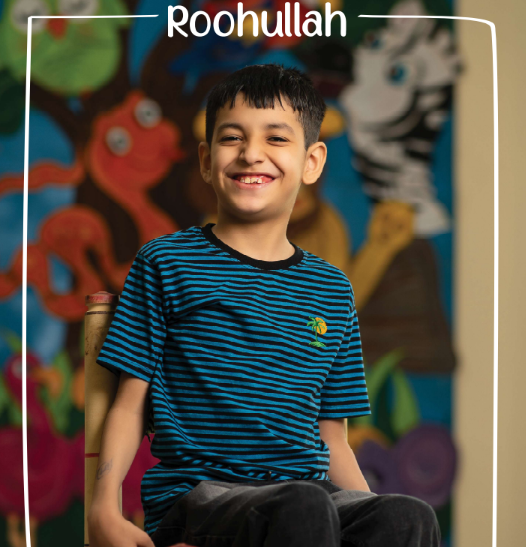
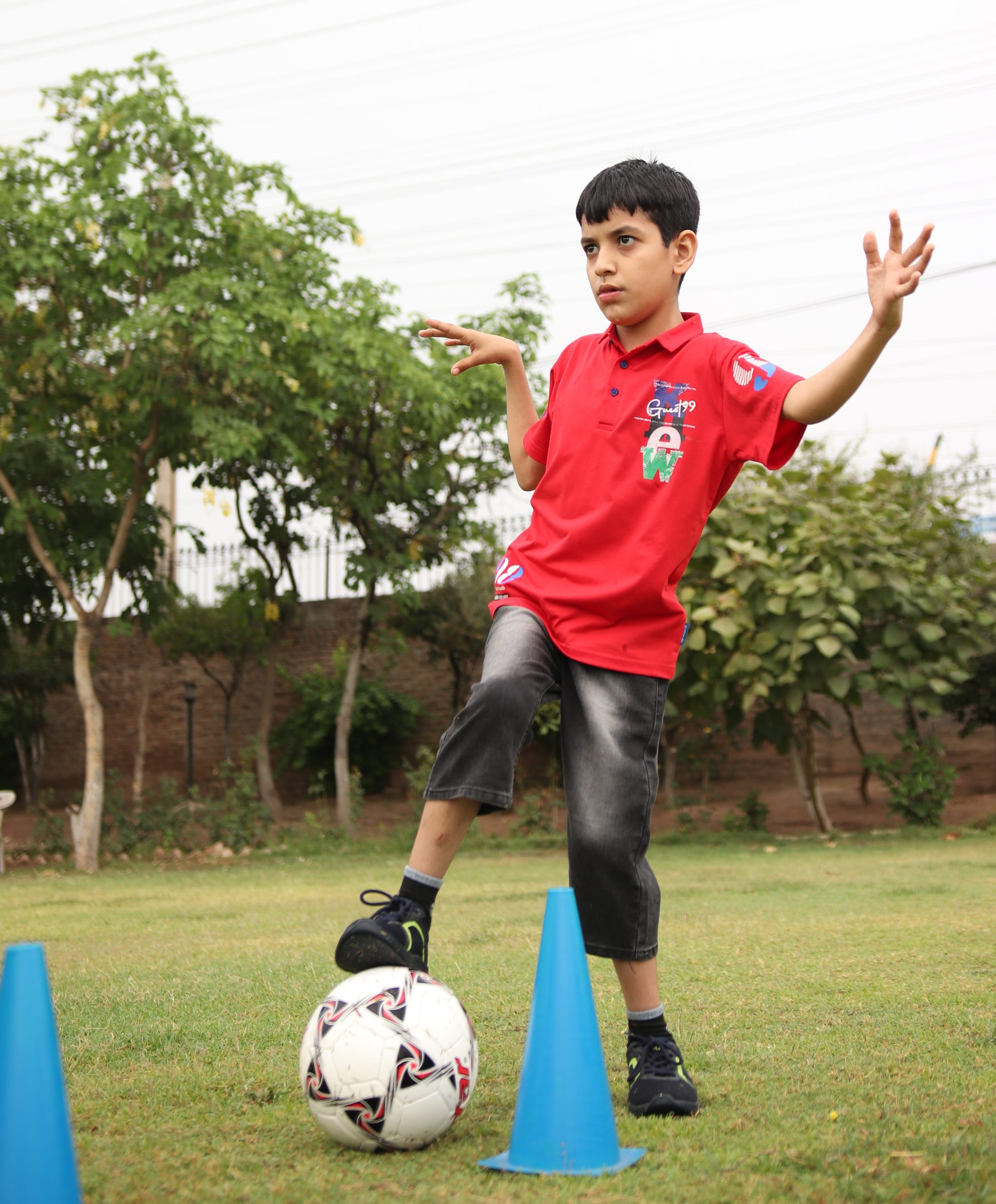
Though Roohullah’s speech impairment prevents him from joining a mainstream school, he continues to thrive in early education classes at AKI. A spirited child with a deep love for sports, Roohullah expressed his wish to play football to his aunt using sign language during AKI’s Sports Gala. At that point, he was still unable to walk, but his passion moved everyone. AKI reached out to the Special Olympics Team in Karachi, setting plans in motion to provide him with training and support.
Today, at 11 years old, Roohullah trains regularly with the Special Olympics team at AKI, alongside other children with special needs. His transformation—from a child entirely dependent on others to an aspiring young athlete—is a powerful testament to the life-changing impact of compassionate, sustained care and the resilience of the human spirit.
Madiha
Madiha’s journey from a fragile newborn, to a walking energetic chiled, is a life changing transformation.
Madeeha was born at 2 a.m. into a deafening silence—she did not cry. Panic gripped the labor room of the ill-equipped government hospital where she entered the world. The newborn struggled to take in oxygen, her fragile body convulsing with seizures, forcing doctors to urgently shift her to a private medical facility. Within just 24 hours of birth, she had suffered multiple seizures, leaving her parents in a state of shock and despair.
When Madeeha finally came home, the joy of her arrival was quickly eclipsed by fear. At three months old, she still could not hold her neck or engage with those around her. Desperate for guidance and hope, her parents turned to Akbar Kare Institute (AKI).
At AKI, the team conducted a thorough assessment and immediately began providing tailored therapy and support. What followed was nothing short of a miracle. By the age of eight months, Madeeha achieved head control—a milestone that moved her mother to tears and sparked new hope for the family.
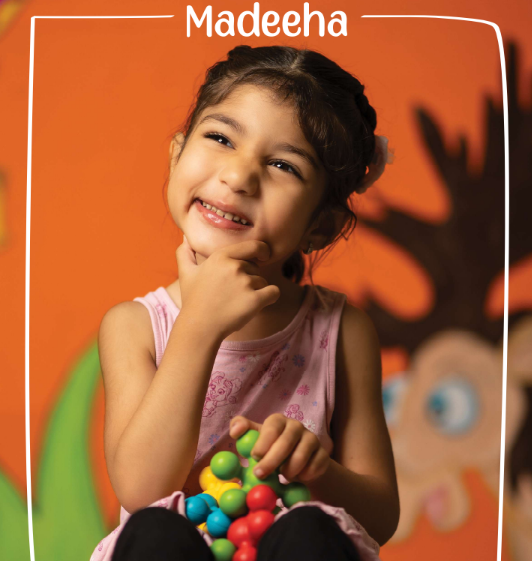
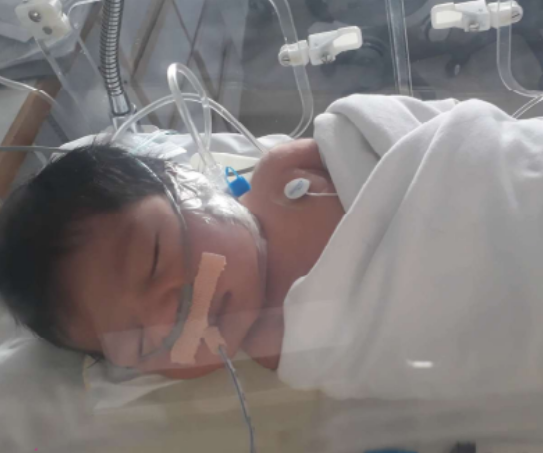
Over the past three years, Madeeha has made extraordinary strides thanks to a combination of early intervention, consistent therapy, and assistive devices like Ankle Foot Orthoses (AFOs) and a standing frame. Each small step in her development reflected the dedication of her family and the unwavering support of the AKI team.
Six months ago, Madeeha took her first independent steps, marking a transformative moment that celebrated years of persistence, love, and care. Today, at 4 years and 8 months old, she is a lively, determined child who continues to defy the odds. Her journey from a fragile newborn to a walking, spirited little girl is a powerful testament to what can be achieved when caregivers and professionals work hand in hand.
Madeeha’s parents, once consumed by fear and uncertainty, now brim with pride, hope, and gratitude. Their daughter’s progress has brought profound joy into their lives and reaffirmed their belief in the life-changing power of early intervention and compassionate, specialized care.
Sumera
Sumera’s story showcase her remarkable resilience and love for learning.
In a small, flood-ravaged village, a mother worked tirelessly as a housemaid, struggling to provide for her children on a meagre daily wage of PKR 20–30. Amidst the daily hardships and scarcity, she gave birth to Sumera.
Sumera’s life was a battle against the odds. She had multiple health conditions. She had asphyxia at birth due to insufficient oxygen reaching her brain and other organs, leading to seizures wracking her small body.
Her condition was exacerbated by another complication — she also had quadriplegic (affecting all four limbs) cerebral palsy, where she couldn’t even lift her head. Sumera’s early years were filled with unimaginable challenges. With her father abandoning the family, her mother had no choice but to bring Sumera to work, propping her up beside her brother on the street outside the house where she worked. Finding work was already difficult for her mother, but having to look after Sumera made it even more challenging. The family’s low income and food insecurity left them in a constant state of struggle. Sumera’s development was severely affected by the lack of proper care and nutrition.
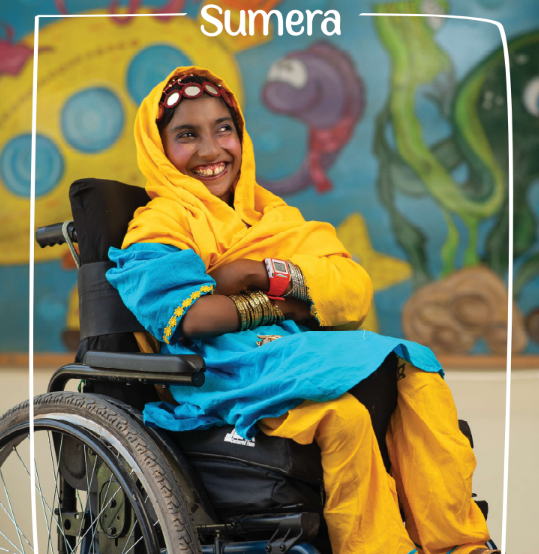
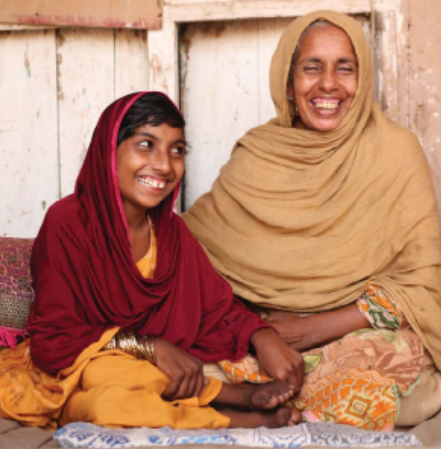
At the age of three, Sumera’s life took a hopeful turn when her mother brought her to the Akbar Kare Institute (AKI). Weak, anxious, and severely malnourished, Sumera could only lie on the floor or sit propped up on a family member’s lap. Despite these difficulties, Sumera and her mother found a sense of joy and hope in AKI’s compassionate environment.
The dedicated team at AKI provided Sumera with a customized wheelchair, which not only improved her mobility but also lightened the burden on her mother’s shoulders. Regular therapy sessions and early education classes at AKI have helped bring life to her hands, so that now she can eat and play on her own. Sumera’s story showcases her remarkable resilience and love for learning.
AKI arranged for a monthly stipend and food rations so that her mother could spend more time caring for Sumera. This support has also enabled Sumera’s brother to be enrolled in school, and the family’s dire circumstances have improved immensely. Today, Sumera is 12 years old. Though she still faces challenges, such as contractures in her legs, her spirit remains unbroken. She attends AKI twice a month, finding happiness in her therapy and education sessions. Sumera dreams of attending school someday, filled with the hope and confidence instilled in her by the transformative care at AKI.
